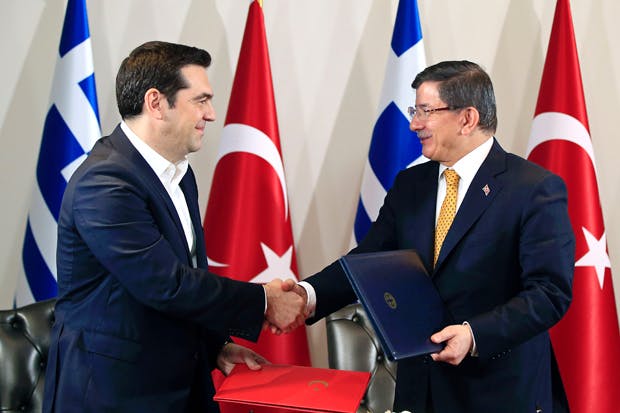Looked at from the narrow perspective of how to deal with the lethal business of human trafficking across the Aegean, this week’s deal between the EU and Turkey shows some encouraging signs. Slowly, the EU seems to be realising that the surest way to stop migrants dying in unseaworthy boats is to adopt similar measures to those used by Tony Abbott the former Australian Prime Minister: turn back the boats, and deport those who land illegally. The Australians paid Malaysia to help handle the migrant problem. The EU is paying Turkey more than £4 billion over the next three years to contain 2.5 million refugees.
The problem, however, is that Turkey is being offered more than money. The EU, in its desperation, says that within a few months it will offer Turkey’s 77 million citizens the ability to travel to any of its 28 member states without the need for a visa. Worse, it will fast-track Turkey’s application to become a full member of the EU — and turn a blind eye to the human rights abuses of Recep Erdogan’s regime. Not that he wants to join the EU: he just wants to show his domestic audience that can behave how he likes, lock up who he likes, and have the EU eating out of his hand.
Looked at in the whole, what we saw this week was not so much a mutual agreement as the EU giving into Turkey’s demands. David Cameron was unable to negotiate a significant deal for Britain in the EU because he used reason, rather than threats.
It is nearly 30 years since Turkey first applied to become a member of the EU. Negotiations in earnest began in 2005, when it was made clear that Turkey would not be admitted until it made serious progress in democratisation and improved its dismal record on human rights. Since then, the country has gone backwards in these respects. Three days before this week’s summit, Turkish police raided the offices of the Istanbul newspaper Zaman. The publication is now run by Erdogan’s government.
This is just the latest in a series of authoritarian crackdowns: the Turkish state has been imprisoning critics, and turning the screw on Kurdish separatists. Now, if Erdogan takes the hammer to the Kurds, he can expect the EU to say nothing.
Erdogan’s recent behaviour suggests he no longer fears censure from the EU. Almost 2,000 people have already been indicted under an article in Turkey’s criminal code forbidding insulting remarks towards the president. This includes a 17-year-old boy who was given a suspended sentence for accusing Erdogan of being ‘the thieving owner of an illegal palace’.
In another case, a journalist is facing 23 years in jail for making claims that state prosecutors have corruptly obtained discounted properties. The way things are going, EU member states may soon find themselves having to cope with a new tide of asylum seekers: Turkish journalists and political activists fleeing their country’s increasingly dictatorial government.
Part of the appeal of the EU project was the idea that it would exert soft power; that countries like Turkey would become more liberal in the hope of being rewarded with closer ties with the European Union. Now the world is beginning to see that the EU’s commitment to democracy and pluralism does not run very deep. The Turkish deal exposes a moral vacuum at the heart of the EU: it is a never-ending compromise between 28 countries who see the world very differently. It is a semi-functioning bureaucracy, driven by panic rather than commitment to any series of beliefs.
Britain was, for many years, in favour of Turkey joining the EU — but that feeling was not shared widely on the continent. France is so opposed to the idea of Turkey joining that the EU constitution was changed to guarantee the French a referendum to block such a move. Now Turkey could be joining anyway. If this happens, the EU’s borders will extend all the way to Syria — a prospect certain to boost support for far-right parties, which are now on the rise across Europe.
So a deal that was intended to reduce immigration may end up having the opposite effect. By ceding visa-free travel for Turkish citizens at the height of a migrant crisis, the EU will further increase migration. People-traffickers have already been caught selling fake Syrian passports, which are being used by non-Syrian economic migrants intending to pose as refugees. From June onwards, Turkish passports may well be in demand if they give instant access to the EU.
At each turn during the immigration crisis, the EU has proved itself capable of making a bad situation worse. The Prime Minister is trying his best to argue that the EU is a source of stability and security in an uncertain world. It is not making his job any easier.
Got something to add? Join the discussion and comment below.
Get 10 issues for just $10
Subscribe to The Spectator Australia today for the next 10 magazine issues, plus full online access, for just $10.














Comments
Don't miss out
Join the conversation with other Spectator Australia readers. Subscribe to leave a comment.
SUBSCRIBEAlready a subscriber? Log in